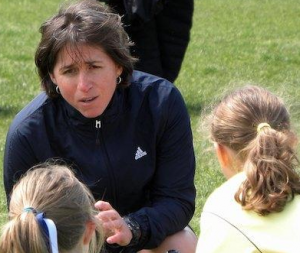Youth Soccer News: Embrace Teaching The Game over Winning
As the hype for professional soccer increases and the emphasis on winning is at an all time high, it is important to remember the difference between youth soccer and professional. Dr. Dina Gentile on the importance of youth coaches placing the focus on teaching the core concepts of the game.
When someone sees a child in a uniform, the first thing they ask is: did you win? The message that our youth athletes are getting from society is that winning is important, very important. Once those players gather on our soccer fields, it is our job as coaches to re-program the thinking of our players so they focus in on learning new skills, playing through adversity and dealing with the variety of challenges that sport delivers.

The colossal task of youth soccer coaches is to teach core concepts of the game and develop hard-working athletes, while fans and families concentrate on over-valuing goals scored and winning.
If youth coaches could look into the future to listen to the comments their former players would have to say to describe them, what words would we hear? As you set out to create your coaching philosophy and team culture, take some time to think about the activities you expose your players to and the impact they have on your team’s collective and individual development.
Coaches have the arduous undertaking of building not only competent soccer players, but athletes who can make decisions, be good teammates, and demonstrate the characteristics of a good sportsperson. What is even more impressive is that we ask that coaches do all of that important development over 2-4 hours per week for two months.
Effective youth coaches aim to build programs from the foundation of high effort (time and commitment) and learning by doing (trial and error). Many youth players want to become immediate soccer stars. Coaches who are player development-centric will teach players to realize that in order to get to that elite level, concentrated efforts need to be placed on skill development first. Coaches are the change agents who instruct that before you can score, you need to learn how to shoot.
Player development at its finest happens when coaches minimize the value placed on the outcome of the game and celebrate the victories of skill enhancement, bouncing back from errors, and the commitment to giving high levels of effort. When players can achieve goals that are within their control (effort, hard work, resiliency), the results will always be positive, regardless of what the scoreboard highlights.
Talent is an endowment that some players naturally reveal at an early age. Too many talented athletes lose or never find their drive to improve their skills because in their minds they are already “good enough.” Talent, which many believe is a gift, can be a curse if soccer players are not exposed to player development over outcome orientation (scoring goals/winning) during their early years in the sport.
The athletes that hone in on getting better at soccer’s most used skills on a daily basis and project high levels of effort will catch and even surpass those result-oriented players. Why? Because the athletes who commit to learning and improving are always trying to capture their personal best, which is within their control. Result-oriented athletes are always trying to beat the competition (outside of an individual’s control).
The players who are driven to enhance their skills are seeking to beat their personal best. That personal best achievement keeps getting better and better because these athletes have the belief that there is so much more to accomplish and improve upon. Soccer players who settle for mediocrity and do not get challenged to become excellent will find that the less talented and harder working player will surpass them on the field.
Youth coaches are encouraged to embrace player development and all of the powerful life lessons that can be learned from sport (hard work, dedication, effort, resiliency). Youth soccer coaches are central to creating a sport environment where the pillars for success are measured by effort and enjoyment, versus competing in the game just for the win. Winning happens when coaches stay true to the player development model and create soccer players who have a passion and deep desire to learn and improve.
SoccerToday columnist Dr. Dina Gentile is a Professor of Sport Management at Endicott College. A volunteer youth coach herself, Dr. Gentile understands from both practical and theoretical experience what happens on the soccer field. Gentile has also coached the Endicott College Soccer Team for 11 years. Gentile is also the owner/director of Precision Soccer, LLC, which operates camps, clinics, and coach education training throughout the year. She is a former All-American and Academic All-American at Adelphi University. Gentile has been inducted into the Adelphi University and Endicott College Halls of Fame. In addition, she is a trainer with Positive Coaching Alliance and the Girls Program Director with New England Premiership Club – Benfica USA. She is the proud coach of her daughter’s and son’s soccer teams in Massachusetts.





